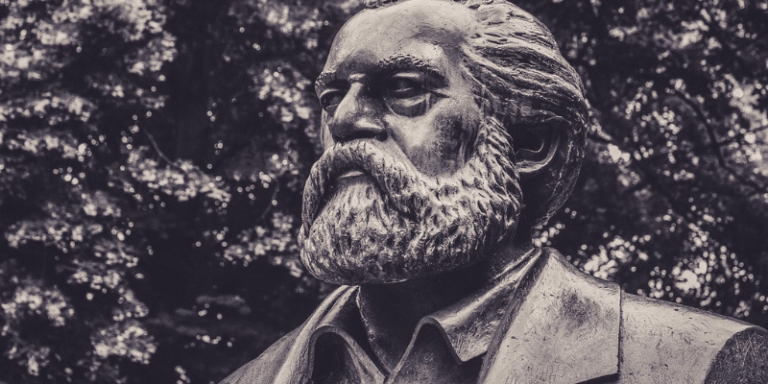Karl Marx (1818–1883) is one of the most influential figures in classical social theory. His ideas form the foundation of Marxism and have deeply impacted sociology, political science, economics, and philosophy. Marx’s theory seeks to explain the dynamics of capitalist societies by focusing on economic production, class relations, and historical change. This article explores the core components of Marx’s classical social theory, including historical materialism, class conflict, alienation, and ideology. It also considers critiques and continuing relevance in the modern context.
Historical Materialism
Marx’s social theory is rooted in the concept of historical materialism, which asserts that the material conditions of a society’s mode of production fundamentally shape its social, political, and intellectual life (Marx & Engels, 1970). Unlike idealist philosophers such as Hegel, who prioritised ideas in historical development, Marx placed economic structures at the centre. He argued that every historical epoch can be understood through the way humans produce their means of subsistence and the relations they enter into during this process.
According to Marx, history is a series of stages, including primitive communism, slavery, feudalism, capitalism, and eventually socialism and communism. Each stage is characterised by specific productive forces (tools, labour, technology) and relations of production (class structures), which are in a constant state of tension. When the productive forces outgrow the existing relations, social revolution becomes possible, leading to a new mode of production (Bottomore & Rubel, 1961).
Class Conflict
Central to Marx’s theory is the concept of class conflict, the idea that history is driven by struggles between opposing social classes. In capitalist societies, the two main classes are the bourgeoisie, who own the means of production (factories, land, capital), and the proletariat, who sell their labour in exchange for wages (Marx & Engels, 1848).
Marx argued that the interests of these classes are inherently antagonistic. The bourgeoisie seek to maximise profit by exploiting the proletariat, who in turn are alienated from the fruits of their labour. This exploitation leads to economic inequality, social instability, and eventually revolutionary change. The Communist Manifesto famously states, “The history of all hitherto existing society is the history of class struggles” (Marx & Engels, 1848, p. 14).
Alienation
Marx’s theory of alienation provides a psychological and sociological account of workers’ experiences under capitalism. In his Economic and Philosophic Manuscripts of 1844, Marx explains that workers are alienated in four key ways: from the product of their labour, from the labour process, from their human potential, and from others (Marx, 1975).
In a capitalist system, workers do not own what they produce; their work becomes a commodity, and they become mere appendages to machines. This leads to a loss of autonomy, creativity, and humanity. Alienation is not merely a personal problem but a structural feature of capitalist production, which systematically disconnects people from their work and each other (Sayers, 2011).
Ideology and False Consciousness
Marx also examined how dominant ideas in society serve to legitimise and sustain the power of the ruling class. This is captured in his concept of ideology, which refers to a system of beliefs that distort reality in favour of the dominant class (Althusser, 1971). According to Marx, “The ideas of the ruling class are in every epoch the ruling ideas” (Marx & Engels, 1970, p. 64).
Working-class people may come to accept the status quo not because it benefits them, but because they are subjected to false consciousness—a misperception of their real social and economic conditions. Education systems, religion, and the media play a key role in reinforcing this ideological control (Gramsci, 1971).
Revolution and Communism
Marx believed that capitalism would eventually be overthrown through a proletarian revolution. Once workers become aware of their exploitation (developing what he called class consciousness), they would rise against the bourgeoisie, abolish private property, and establish a classless, stateless society—communism (Marx & Engels, 1848).
In such a society, the means of production would be communally owned, eliminating class divisions and alienation. Work would become a fulfilling activity rather than a means of survival, and individuals could develop their full human potential (Callinicos, 1983).
Critiques of Marx’s Theory
Despite its enduring impact, Marx’s theory has faced numerous critiques. Critics argue that his economic determinism downplays the role of culture, politics, and individual agency. Weber (1946) criticised Marx for ignoring the influence of ideas and religion in shaping society, introducing the concept of verstehen (understanding) as a counterpoint.
Postmodern theorists such as Foucault (1980) reject grand narratives like historical materialism, arguing that power is more diffuse and not reducible to class relations. Feminist theorists also critique Marxism for its lack of attention to gender relations and the unpaid labour of women in the household (Hartmann, 1979).
Moreover, the failure of 20th-century socialist regimes—many of which claimed to be based on Marxist principles—has raised questions about the viability of Marx’s political programme. However, contemporary Marxists argue that these states diverged from Marx’s original vision, and that his critique of capitalism remains relevant.
Contemporary Relevance
Marx’s classical social theory continues to inform contemporary debates about inequality, globalisation, and economic crises. Scholars such as David Harvey (2005) and Thomas Piketty (2014) have revived interest in class analysis in light of increasing income inequality and financial instability. The 2008 global financial crisis, for example, prompted renewed interest in Marxist explanations of capitalist crisis tendencies.
In addition, Marxist perspectives are influential in cultural studies, critical theory, and political activism. The climate crisis has also prompted eco-socialist interpretations of Marx, highlighting how capitalist production contributes to environmental degradation (Foster, 2000).
Karl Marx’s classical social theory offers a powerful critique of capitalism and a vision for social transformation. His analysis of class conflict, alienation, and ideology remains foundational to the social sciences. While critiques have led to revisions and re-interpretations, Marx’s core insight—those economic structures shape social life and that capitalism generates inherent contradictions—continues to resonate in the 21st century. In a world marked by deepening inequality, climate breakdown, and political unrest, Marx’s ideas remain a vital tool for understanding and challenging existing power structures.
References
Althusser, L. (1971). Lenin and Philosophy and Other Essays. London: New Left Books.
Bottomore, T. B. and Rubel, M. (1961). Karl Marx: Selected Writings in Sociology and Social Philosophy. London: Penguin.
Callinicos, A. (1983). Marxism and Philosophy. Oxford: Clarendon Press.
Foster, J. B. (2000). Marx’s Ecology: Materialism and Nature. New York: Monthly Review Press.
Foucault, M. (1980). Power/Knowledge: Selected Interviews and Other Writings 1972–1977. Brighton: Harvester Press.
Gramsci, A. (1971). Selections from the Prison Notebooks. London: Lawrence and Wishart.
Hartmann, H. (1979). The Unhappy Marriage of Marxism and Feminism: Towards a More Progressive Union. Capital & Class, 3(2), pp.1–33.
Harvey, D. (2005). A Brief History of Neoliberalism. Oxford: Oxford University Press.
Marx, K. (1975). Early Writings. Translated by R. Livingstone and G. Benton. London: Penguin.
Marx, K. and Engels, F. (1848). The Communist Manifesto. London: Penguin (1985 edition).
Marx, K. and Engels, F. (1970). The German Ideology. London: Lawrence and Wishart.
Piketty, T. (2014). Capital in the Twenty-First Century. Cambridge, MA: Harvard University Press.
Sayers, S. (2011). Marx and Alienation: Essays on Hegelian Themes. Basingstoke: Palgrave Macmillan.
Weber, M. (1946). From Max Weber: Essays in Sociology. Translated by H. Gerth and C. Wright Mills. New York: Oxford University Press.









